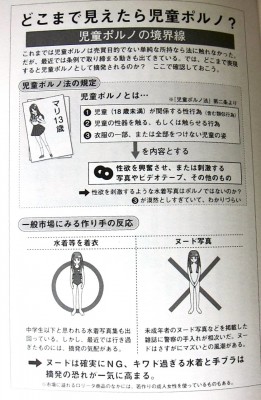Just popping in for a second to post this article by Richard Smart (or @tokyorich as we know him) on Polaris Project’s hand in busting a child pornographer who had wrapped a young boy into an unusual web of sexual slavery. It was printed in the Japan Times on Monday. Jake makes his appearance having played a large role in the case in question, in working with the police to see a tip was turned into a criminal case, but overall the article is a great look into the efforts Polaris Project is making here in Japan and the struggles they face as an NGO.
For Polaris, the work of helping to catch abusers of children will continue, along with its battle against human trafficking. The organization sees the two crimes as linked.
“Child abuse can be physical abuse, sexual abuse or neglect, it happens anywhere,” Polaris Japan director Shihoko Fujiwara tells The Japan Times. “The kids (that are abused) are especially vulnerable though, because they don’t have anybody to protect them. I meet a lot of kids who survive by selling their body because that is how they have to survive. Those kids who are abused are easy targets for traffickers, whose aim is huge profit from sexual exploitation.”
Fujiwara says that the Japan branch of the organization, which is run by two full-time staff, a part-time worker and around 22 volunteers, helped around 35 to 40 victims escape sexual exploitation at the hands of traffickers last year. In addition to this, the organization helps to train employees in fields such as teaching, social work and law enforcement on the dangers and signs of trafficking.
Read the rest at A light of hope for abused children.
Ironically, the day before the above article was published, the Tokyo Metropolitan Assembly killed an ambiguous bill that would prohibit the sale to minors of manga, anime and video games that depict children in sexualized situations. The idea doesn’t seem to hold much popularity with lawmakers or those involved in the industry, as illustrated by coverage at Anime News Network and The Japan Times.
Like most prefecture-level governments in Japan, Tokyo already has an existing Youth Healthy Development Ordinance to prohibit the sale of “harmful publications” to minors. The Tokyo Metropolian Government’s bill would specify that such “harmful publications” would include sexualized yet non-explicit materials that do not involve actual people. 1,421 manga creators, 10 publishing companies, the Japan Pen Club, the Japan Cartoonists Association, and the Writers Guild of Japan voiced their opposition to the bill.
(via Anime News Network)
The Japan Times quotes Meiji University associate professor Yukari Fujimoto as saying that hiding depictions of minors in sexual situations “can hamper the ability of children to develop a ‘healthy’ attitude about sex.” The proposed bill does stink of a conservative book-burning, but one would wonder what American study Fujimoto got her statistics from on exposure to sexual material and rates of sexual crimes. And while there are dozens if not more studies on the affect of pornography on children, why is the focus not more on keeping sexualized images of youth out of the hands of adults?
The article concludes with Fujimoto saying that the authorities should work harder on “preventing real children from being sexually attacked.” While this is true it could be said that the lightness with which sexualized images of youth are looked upon–from pornographic manga to junior idols, not to mention legalized possession of child pornography–is at the root of the problem and an excuse for police and authorities to remain slow-to-act when the few laws that do exist actually have been broken.

If child pornography and border-line materials didn’t bring so much money to so many people, it would have been made illegal a long time ago.
Thanks for the story and thanks to all the hardworking and dedicated people of the Polaris Project.
The final sentence on this entry is about as succinct and true as it gets. It is ultimately all about the money.
Keep up the good work!
My biggest disappointment so far with the DPJ has been that they aren’t interested in passing legislation that bans simple possession of child pornography. While some change in government was probably necessary, I do wish the LDP had been able to hold on to power long enough to pass the legislation when they had the chance.
I don’t have confidence in any of the parties. Every time a child porn bill get voted on, something seems to happen behind closed doors.
I am curious as to how we can support Polaris in Japan, beyond donations. If I am and other followers of this blog are in Japan how can we be more involved? Thanks.
I second that motion. I’m moving to Japan next year and would love to help.